- Home
- V. S. Naipaul
Literary Occasions Page 7
Literary Occasions Read online
Page 7
Hat was our neighbor on the street. He wasn’t negro or mulatto. But we thought of him as half-way there. He was a Port of Spain Indian. The Port of Spain Indians—there were pockets of them—had no country roots, were individuals, hardly a community, and were separate from us for an additional reason: many of them were Madrassis, descendants of South Indians, not Hindi-speaking, and not people of caste. We didn’t see in them any of our own formalities or restrictions; and though we lived raggedly ourselves (and were far too numerous for the house), we thought of the other Indians in the street only as street people.
That shout of “Bogart!” was in more than one way a shout from the street. And, to add to the incongruity, it was addressed to someone in our yard: a young man, very quiet, yet another person connected in some way with my mother’s family. He had come not long before from the country and was living in the separate one-room building at the back of our yard.
We called this room the “servant room.” Port of Spain houses, up to the 1930s, were built with these separate servant rooms—verandah-less little boxes, probably descended in style from the ancillary “negro-houses” of slave times. I suppose that in one or two houses in our street servants of the house actually lived in the servant room. But generally it wasn’t so. Servant rooms, because of the privacy they offered, were in demand, and not by servants.
It was wartime. The migration of my own family into the town had become part of a more general movement. People of all conditions were coming into Port of Spain to work at the two American bases. One of those bases had been built on recently reclaimed land just at the end of our street—eight houses down. Twice a day we heard the bugles; Americans, formal in their uniforms, with their khaki ties tucked into their shirts, were another part of the life of our street. The street was busy; the yards were crowded. Our yard was more crowded than most. No servant ever lodged in our servant room. Instead, the room sheltered a succession of favoured transients, on their way to better things. Before the big family rush, some of these transients had been outsiders; but now they were mostly relations or people close to the family, like Bogart.
The connection of Bogart with my mother’s family was unusual. At the turn of the century Bogart’s father and my mother’s father had travelled out together from India as indentured immigrants. At some time during the long and frightening journey they had sworn a bond of brotherhood; that was the bond that was being honoured by their descendants.
Bogart’s people were from the Punjab, and handsome. The two brothers we had got to know were ambitious men, rising in white-collar jobs. One was a teacher; the other (who had passed through the servant room) was a weekend sportsman who, in the cricket season, regularly got his name in the paper. Bogart didn’t have the education or the ambition of his brothers; it wasn’t clear what he did for a living. He was placid, without any pronounced character, detached, and in that crowded yard oddly solitary.
Once he went away. When he came back, some weeks or months later, it was said that he had been “working on a ship.” Port of Spain was a colonial port, and we thought of sailors as very rough, the dregs. So this business of working on a ship—though it suggested money as well as luck, for the jobs were not easy to come by—also held suggestions of danger. It was something for the reckless and the bohemian. But it must have suited Bogart, because after a time he went away—disappeared—again.
There was a story this time that he had gone to Venezuela. He came back; but I had no memory of his return. His adventures—if he had had any—remained unknown to me. I believe I was told that the first time he had gone away, to work on the ship, he had worked as a cook. But that might have been a story I made up myself. All that I knew of Bogart while he lived in the servant room was what, as a child, I saw from a distance. He and his comings and goings were part of the confusion and haphazardness and crowd of that time.
I saw a little more of him four or five years later. The war was over. The American base at the end of the street was closed. The buildings were pulled down, and the local contractor, who knew someone in our family, gave us the run of the place for a few days, to pick up what timber we wanted. My mother’s extended family was breaking up into its component parts; we were all leaving my grandmother’s house. My father had bought a house of his own; I used timber from the old American base to make a new front gate. Soon I had got the Trinidad government scholarship that was to take me to Oxford.
Bogart was still reportedly a traveller. And in Trinidad now he was able to do what perhaps he had always wanted to do: to put as much distance as possible between himself and people close to him. He was living in Carenage, a seaside village five miles or so west of Port of Spain. Carenage was a negro-mulatto place, with a Spanish flavour (’pagnol, in the local French patois). There were few Indians in Carenage; that would have suited Bogart.
With nothing to do, waiting to go away, I was restless, and I sometimes cycled out to Carenage. It was pleasant after the hot ride to splash about in the rocky sea, and pleasant after that to go and have a Coca-Cola at Bogart’s. He lived in a side street, a wandering lane, with yards that were half bush, half built-up. He was a tailor now, apparently with customers; and he sat at his machine in his open shop, welcoming but undemonstrative, as placid, as without conversation, and as solitary as ever. But he was willing to play with me. He was happy to let me paint a sign-board for his shop. The idea was mine, and he took it seriously. He had a carpenter build a board of new wood; and on this, over some days, after priming and painting, I did the sign. He put it up over his shop door, and I thought it looked genuine, a real sign. I was amazed; it was the first sign-board I had ever done.
The time then came for me to go to England. I left Bogart in Carenage. And that was where he had continued to live in my memory, faintly, never a figure in the foreground: the man who had worked on a ship, then gone to Venezuela, sitting placidly ever after at his sewing machine, below my sign, in his little concrete house-and-shop.
That was Bogart’s story, as I knew it. And—after all our migrations within Trinidad, after my own trip to England and my time at Oxford—that was all the story I had in mind when—after two failed attempts at novels—I sat at the typewriter in the freelances’ room in the Langham Hotel, to try once more to be a writer. And luck was with me that afternoon. Every morning when he got up Hat would sit on the banister of his back verandah and shout across, “What happening there, Bogart?” Luck was with me, because that first sentence was so direct, so uncluttered, so without complications, that it provoked the sentence that was to follow. Bogart would turn in his bed and mumble softly, so that no one heard, “What happening there, Hat?”
The first sentence was true. The second was invention. But together—to me, the writer—they had done something extraordinary. Though they had left out everything—the setting, the historical time, the racial and social complexities of the people concerned—they had suggested it all; they had created the world of the street. And together, as sentences, words, they had set up a rhythm, a speed, which dictated all that was to follow.
The story developed a first-person narrator. And for the sake of speed, to avoid complications, to match the rhythm of what had gone before, this narrator could not be myself. My narrator lived alone with his mother in a house on the street. He had no father; he had no other family. So, very simply, all the crowd of my mother’s extended family, as cumbersome in real life as it would have been to a writer, was abolished; and, again out of my wish to simplify, I had a narrator more in tune with the life of the street than I had been.
Bogart’s tailoring business, with the sign-board I had done for him, I transferred from the Carenage side street to the Port of Spain servant room, and with it there came some hint of the silent companionableness I had found in Bogart at that later period. The servant room and the street—the houses, the pavements, the open yards, the American base at the end of the street—became like a stage set. Anyone might walk down the street; anyone might turn up in the
servant room. It was enough—given the rhythm of the narrative and its accumulating suggestions of street life—for the narrator to say so. So Bogart could come and go, without fuss. When, in the story, he left the servant room for the first time, it took little—just the dropping of a few names—to establish the idea of the street as a kind of club.
So that afternoon in the Langham Hotel Port of Spain memories, disregarded until then, were simplified and transformed. The speed of the narrative—that was the speed of the writer. And everything that was later to look like considered literary devices came only from the anxiety of the writer. I wanted above all to take the story to the end. I feared that if I stopped too long anywhere I might lose faith in what I was doing, give up once more and be left with nothing.
Speed dictated the solution of the mystery of Bogart. He wished to be free (of Hindu family conventions, but this wasn’t stated in the story). He was without ambition, and had no skill; in spite of the sign-board, he was hardly a tailor. He was an unremarkable man, a man from the country, to whom mystery and the name of Bogart had been given by the street, which had its own city sense of drama. If Bogart spent whole afternoons in his servant room playing Patience, it was because he had no other way of passing the time. If, until he fell into the character of the film Bogart, he had no conversation, it was because he had little to say. The street saw him as sensual, lazy, cool. He was in fact passive. The emotional entanglements that called him away from the street were less than heroic. With women, Bogart—unlike most men of the street—had taken the easy way out. He was that flabby, emasculated thing, a bigamist. So, looking only for freedom, the Bogart of my story had ended up as a man on the run. It was only in the solitude of his servant room that he could be himself, at peace. It was only with the men and boys of the street that he could be a man.
The story was short, three thousand words, two foolscap sheets and a bit. I had—a conscious piece of magic that afternoon—set the typewriter at single space, to get as much as possible on the first sheet and also to create the effect of the printed page.
People were in and out of the freelances’ room while I typed. Some would have dropped by at the BBC that afternoon for the company and the chat, and the off-chance of a commission by a producer for some little script. Some would have had work to do.
I suppose Ernest Eytle would have come in, to sit at the other typewriter and to peck, with many pauses, at the “links” or even a “piece” for the magazine programme. And Ernest’s beautifully spoken words, crackling over the short wave that evening, would suggest a busy, alert man, deep in the metropolitan excitements of London, sparing a few minutes for his radio talk. He was a mulatto from British Guiana. He was dark-suited, fat and slow; when, some years later, I heard he had died, I was able mentally to transfer him, without any change, and without any feeling of shock, to a coffin. As much as broadcasting, Ernest liked the pub life around Broadcasting House. This sitting at the typewriter in the gloomy freelances’ room was like an imposition; and Ernest, whenever he paused to think, would rub a heavy hand down his forehead to his eyebrows, which he pushed back the wrong way; and then, like a man brushing away cobwebs, he would appear to dust his cheek, his nose, his lips and chin.
Having done that with Ernest, I should say that my own typing posture in those days was unusual. My shoulders were thrown back as far as they could go; my spine was arched. My knees were drawn right up; my shoes rested on the topmost struts of the chair, left side and right side. So, with my legs wide apart, I sat at the typewriter with something like a monkey crouch.
THE FREELANCES’ room was like a club: chat, movement, the separate anxieties of young or youngish men below the passing fellowship of the room. That was the atmosphere I was writing in. That was the atmosphere I gave to Bogart’s Port of Spain street. Partly for the sake of speed, and partly because my memory or imagination couldn’t rise to it, I had given his servant room hardly any furniture: the Langham room itself was barely furnished. And I benefited from the fellowship of the room that afternoon. Without that fellowship, without the response of the three men who read the story, I might not have wanted to go on with what I had begun.
I passed the three typed sheets around.
John Stockbridge was English. He worked for many BBC programmes, domestic and overseas. Unlike the rest of us, he carried a briefcase; and that briefcase suggested method, steadiness, many commissions. At our first meeting in the freelances’ room three or four months before, he hadn’t been too friendly—he no doubt saw me as an Oxford man, untrained, stepping just like that into regular radio work, taking the bread out of the mouths of more experienced men. But then his attitude towards me had become one of schoolmasterly concern. He wanted to rescue me from what, with his English eyes, he saw as my self-neglect. He wanted me to make a better job of myself, to present myself well, to wear better clothes, and especially to get rid of my dingy working-class overcoat. (I knew nothing about clothes, but I had always thought the overcoat was wrong: it had been chosen for me, before I went up to Oxford, by the Maltese manageress of an Earl’s Court boarding house.) Now, after he had read the story, John made a serious face and spoke a prodigious prophecy about my future as a writer. On such little evidence! But it was his way of finally accepting my ambition and my London life, and giving me a little blessing.
Andrew Salkey was a Jamaican. He worked in a nightclub, was also trying to get started as a writer, and had just begun to do broadcasts, talks and readings. He compared learning to write with trying to wrap a whip around a rail; he thought I had begun to make the whip “stick.” He detected, and made me take out, one or two early sentences where I had begun to lose faith in the material and had begun to ridicule, not the characters, but the idea that what I was doing was a real story.
The most wholehearted acceptance came from Gordon Woolford. He was from British Guiana. He came from a distinguished colonial family. He said he had some African ancestry, but it didn’t show. Some deep trouble with his father had kept Gordon away from his family and committed him, after a privileged pre-war upbringing in Belgium and England, to a hard bohemian life in London. He was an unusually handsome man, in his mid-thirties. He had married a French girl, whom he had met when she was an assistant in one of the big London stores. That marriage had just broken up. Gordon was writing a novel about it, On the Rocks; it wasn’t something he was going to finish. He changed jobs often; he loved writing; his favourite book—at least it was always with him during his drinking bouts—was Scoop.
Something in the Bogart story touched Gordon. When he finished reading the story he folded the sheets carefully; with a gesture as of acceptance he put the sheets in his inner jacket pocket; and then he led me out to the BBC club—he was not on the wagon that day. He read the story over again, and he made me read it with him, line by line, assessing the words and the tone: we might have been rehearsing a broadcast. The manuscript still has his foldmarks and his wine stains.
During the writing of the Bogart story some memory—very vague, as if from a forgotten film—had come to me of the man who in 1938 or 1939, five years before Bogart, had lived in his servant room. He was a negro carpenter; the small sheltered space between the servant room and the back fence was at once his kitchen and workshop. I asked him one day what he was making. He said—wonderfully to the six-year-old child who had asked the question—that he was making “the thing without a name.”
It was the carpenter’s story that I settled down to write the next day in the freelances’ room. I had little to go on. But I had a street, already peopled; I had an atmosphere; and I had a narrator. I stuck to the magic of the previous day: the non-rustle BBC paper, the typewriter set at single space. And I was conscious, with Gordon Woolford’s help, of certain things I had stumbled on the previous day: never to let the words get too much in the way, to be fast, to add one concrete detail to another, and above all to keep the tone right.
I mentally set the servant room in another yard. The only thing
that Popo, who called himself a carpenter, ever built was the little galvanized-iron workshop under the mango tree at the back of his yard. And then scattered memories, my narrator, the life of the street, and my own childhood sense (as a six-year-old coming suddenly to Port of Spain from the Hindu rigours of my grandmother’s house in the country) of the intensity of the pleasures of people on the street, gave the carpenter a story. He was an idler, a happy man, a relisher of life; but then his wife left him.
Over the next few days the street grew. Its complexities didn’t need to be pointed; they simply became apparent. People who had only been names in one story got dialogue in the next, then became personalities; and old personalities became more familiar. Memory provided the material; city folklore as well, and city songs. An item from a London evening paper (about a postman throwing away his letters) was used. My narrator consumed material, and he seemed to be able to process every kind of material.
Even Gordon was written into the street. We were on the top of a bus one evening, going back from the BBC to Kilburn, the Irish working-class area where I lived in two rooms in the house of a BBC commissionaire. Gordon was talking of some early period of his life, some period of luxury and promise. Then he broke off, said, “But that was a long time ago,” and looked down through the reflections of glass into the street. That went to my heart. Within a few days I was to run it into the memory of a negro ballad-maker, disturbed but very gentle, who had called at my grandmother’s house in Port of Spain one day to sell copies of his poems, single printed sheets, and had told me a little of his life.
The stories became longer. They could no longer be written in a day. They were not always written in the freelances’ room. The technique became more conscious; it was not always possible to write fast. Beginnings, and the rhythms they established, didn’t always come naturally; they had to be worked for. And then the material, which at one time had seemed inexhaustible, dried up. I had come to the end of what I could do with the street, in that particular way. My mother said, “You getting too wild in this place. I think is high time you leave.” My narrator left the street, as I had left Trinidad five years before. And the excitement I had lived with for five or six weeks was over.

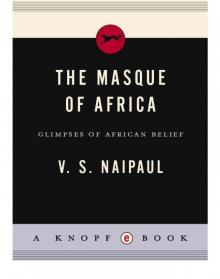 The Masque of Africa: Glimpses of African Belief
The Masque of Africa: Glimpses of African Belief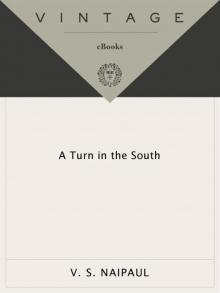 A Turn in the South
A Turn in the South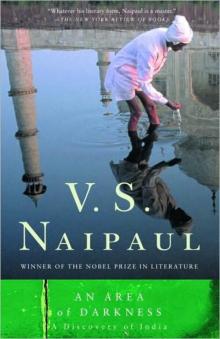 An Area of Darkness
An Area of Darkness Literary Occasions: Essays
Literary Occasions: Essays A Way in the World
A Way in the World Among the Believers: An Islamic Journey
Among the Believers: An Islamic Journey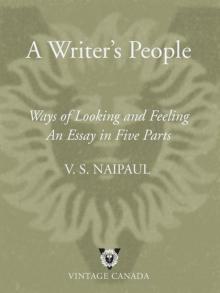 A Writer's People: Ways of Looking and Feeling
A Writer's People: Ways of Looking and Feeling The Mimic Men: A Novel
The Mimic Men: A Novel Collected Short Fiction
Collected Short Fiction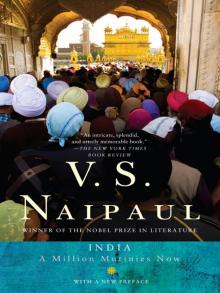 India: A Million Mutinies Now
India: A Million Mutinies Now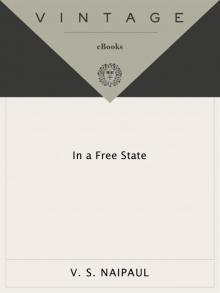 In a Free State
In a Free State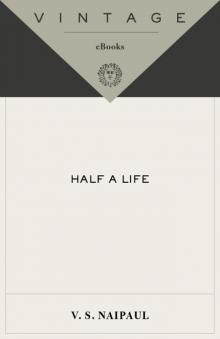 Half a Life
Half a Life Beyond Belief: Islamic Excursions Among the Converted Peoples
Beyond Belief: Islamic Excursions Among the Converted Peoples Guerrillas
Guerrillas A House for Mr. Biswas
A House for Mr. Biswas The Writer and the World: Essays
The Writer and the World: Essays Magic Seeds
Magic Seeds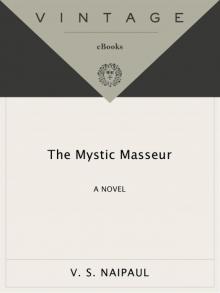 The Mystic Masseur
The Mystic Masseur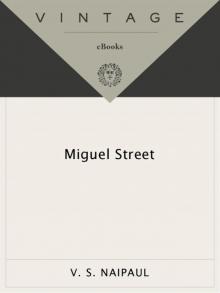 Miguel Street
Miguel Street The Return of Eva Perón, With the Killings in Trinidad
The Return of Eva Perón, With the Killings in Trinidad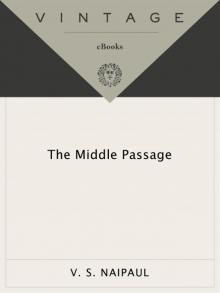 The Middle Passage
The Middle Passage A Bend in the River
A Bend in the River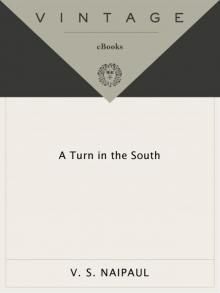 A Turn in the South (Vintage International)
A Turn in the South (Vintage International) Among the Believers
Among the Believers Literary Occasions
Literary Occasions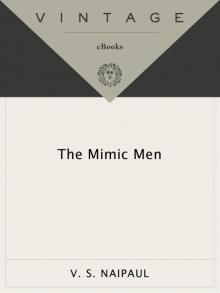 The Mimic Men
The Mimic Men The Writer and the World
The Writer and the World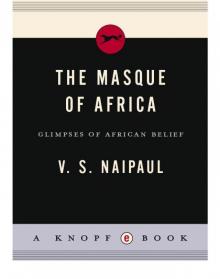 The Masque of Africa
The Masque of Africa